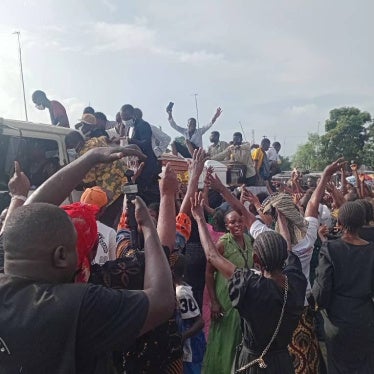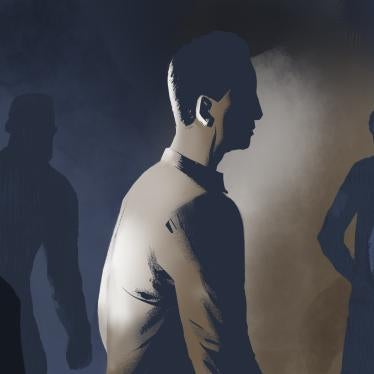(Nairobi) – The Kenyan authorities should investigate and prosecute those responsible for violence in the Coast Region over the past month. The investigations should extend to organizers and politicians linked to the Tana River clashes in which more than 110 people have been killed and 6,000 displaced. Human Rights Watch conducted research in Tana River in late August and early September, 2012, interviewing 16 witnesses and victims of the violence.
On September 12, Dhadho Godhana, a Member of Parliament, was arrested in connection with the violence, but recent Human Rights Watch research suggests that at least three other politicians may have been involved. The investigations should include the role of these politicians as well as government officials and police who failed to act to prevent the violence despite warnings that it was imminent. Where there is evidence that those investigated committed criminal acts, they should be prosecuted, Human Rights Watch said.
“For decades the Kenya police have failed to investigate politicians who may be implicated in serious crimes,” said Leslie Lefkow, deputy Africa director at Human Rights Watch. “If they are ready to do so now the authorities must be even handed and investigate all sides.”
The at least 110 deaths, including nine of policemen, in Tana River County began with an attack on August 22 on the village of Riketa. That attack led to revenge attacks on September 7, 10, and 11.
The Human Rights Watch researchers found that several local politicians may have been involved in organizing the violence and that the police and local administration in Tana River failed to respond to reports from residents over the past six months that violence could be imminent. Police are failing to provide adequate security as revenge attacks continue and communities continue to arm themselves.
Godhana, a member of parliament for the Galole constituency in Tana River county, was arrested in Nairobi, charged in court with inciting the public to violence, and released on bond.
The violence in August and September was the culmination of smaller-scale attacks, cattle raids and counterattacks since January between the ethnic Pokomo and Orma communities. Both communities have lost lives and livestock, but police either failed to respond to the attacks or arrested people and then released them without investigations.
On the morning of August 22, up to 100 armed young men from the Pokomo community attacked Riketa, an Orma village, surrounding the settlement and killing 54 people, mostly women and children. The attack displaced more than 200 families.
The attack was apparently in response to an earlier attack by members of the Orma on the Pokomo community of Kau in which four people were killed. Witnesses told Human Rights Watch that the Riketa attackers surrounded the village, set fire to homes, and used machetes to kill the inhabitants they found there.
A series of reprisal attacks for the Riketa incident followed in September. On September 7, a group of heavily armed Orma militia attacked Chamwanamuma village, killing at least 11 Pokomo. The militia then exchanged gunfire for several hours with police who had been guarding a neighboring village.
Witnesses told Human Rights Watch that the attackers surrounded Chamwanamuma to prevent residents from escaping, killing residents with machetes, spears, and guns until the police from the neighboring village intervened. Pokomo sources told Human Rights Watch that the Pokomo community had been concerned about the possibility of a revenge attack by the Orma, following the August 22 attack, and had warned the police.
On September 10, following the Chamwanamuma attack, members of the Pokomo apparently decided to retaliate with an early morning raid on Kilelengwani village that left another 40 people, including the nine police officers, dead. Despite a night to dawn curfew announced by President Mwai Kibaki soon after the Kilelengwani attack by the Pokomo, members of the Orma broke the curfew on September 11 and attacked the village of Semikaro, killing four people.
Members of both communities, including victims of the attacks, told Human Rights Watch that area politicians who hoped to win seats in next year’s elections were involved in the violence on both sides and that the villagers had informed the police about their suspicions. They said the recent violence was aimed at displacing the supporters of opponents. Some Pokomo elders said they had been aware of the plans for the attack on Riketa and had tried, unsuccessfully, to urge the youth not to carry out the plan.
On August 23, the day after the Riketa attack, Internal Security Minister Yusuf Haji, in a speech in parliament, accused Godhana, the member of parliament from Galole who also hopes to become Tana River county governor, of refusing to attend peace meetings and asked police to investigate his role in the violence. Minister Haji is backing a rival candidate for the Tana River governor position, Hussein Dado.
Godhana was summoned by police for questioning on September 6. The acting secretary of the Internal Security Ministry, Shadrak Mwadime, told Human Rights Watch on September 10 that police were investigating some politicians over the violence in Tana River.
Human Rights Watch research indicates that at least three other politicians may have been involved in inciting or organizing the violence. Police should continue to investigate and prosecute all those potentially responsible for crimes, no matter how high-level they are, Human Rights Watch said.
Witnesses reported seeing Constituency Development Fund (a fund controlled by sitting MPs) vehicles for Garsen and Galole constituency carrying fuel to Riketa that was later used to burn buildings in the attack.
“Several politicians or political hopefuls have been linked to the violence in Tana River,” Lefkow said. “Ending the political violence in Tana River requires bringing to book those behind the clashes on both sides.”








